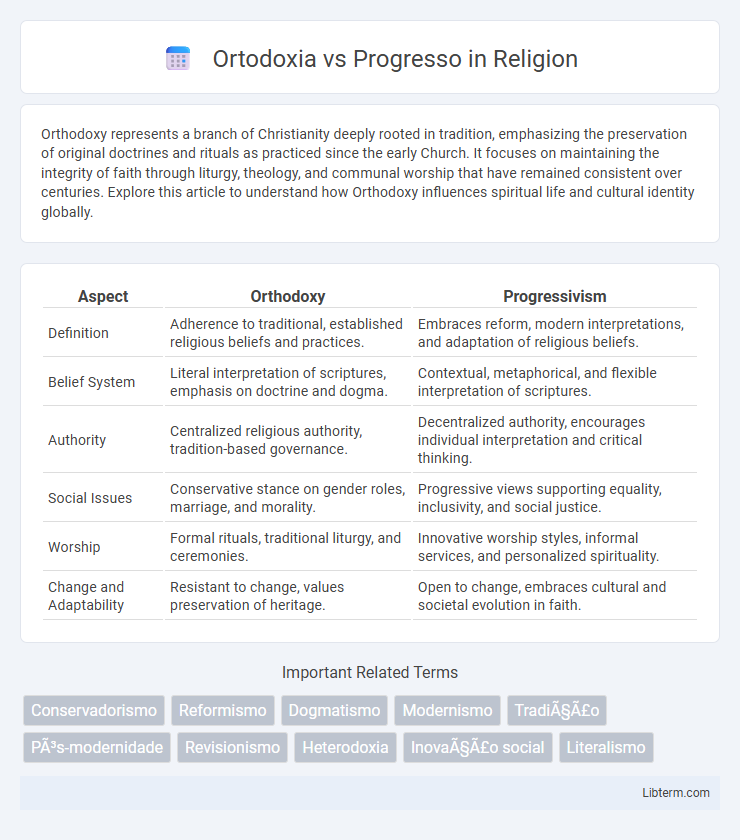Orthodoxy represents a branch of Christianity deeply rooted in tradition, emphasizing the preservation of original doctrines and rituals as practiced since the early Church. It focuses on maintaining the integrity of faith through liturgy, theology, and communal worship that have remained consistent over centuries. Explore this article to understand how Orthodoxy influences spiritual life and cultural identity globally.
Table of Comparison
| Aspect | Orthodoxy | Progressivism |
|---|---|---|
| Definition | Adherence to traditional, established religious beliefs and practices. | Embraces reform, modern interpretations, and adaptation of religious beliefs. |
| Belief System | Literal interpretation of scriptures, emphasis on doctrine and dogma. | Contextual, metaphorical, and flexible interpretation of scriptures. |
| Authority | Centralized religious authority, tradition-based governance. | Decentralized authority, encourages individual interpretation and critical thinking. |
| Social Issues | Conservative stance on gender roles, marriage, and morality. | Progressive views supporting equality, inclusivity, and social justice. |
| Worship | Formal rituals, traditional liturgy, and ceremonies. | Innovative worship styles, informal services, and personalized spirituality. |
| Change and Adaptability | Resistant to change, values preservation of heritage. | Open to change, embraces cultural and societal evolution in faith. |
Introdução à Ortodoxia e ao Progresso
Introducao a Ortodoxia destaca a valorizacao das tradicoes, normas e estruturas sociais estabelecidas, promovendo a estabilidade e a continuidade cultural. Progresso enfatiza a inovacao, mudancas sociais e avancos tecnologicos para alcancar melhorias no bem-estar humano e na justica social. O confronto entre Ortodoxia e Progresso reflete tensoes entre preservacao e transformacao na evolucao das sociedades.
Origens e Fundamentos da Ortodoxia
The origins and foundations of Orthodoxy are deeply rooted in the early Christian traditions, emphasizing adherence to the Nicene Creed and the ecumenical councils that shaped its theology. Orthodox doctrine is grounded in the preservation of apostolic teachings, liturgical continuity, and the consensus of the Church Fathers. This theological and historical framework contrasts with progressive movements, which often advocate for reinterpretation and reform based on contemporary values.
O Conceito de Progresso na Sociedade Moderna
The concept of progress in modern society is often contested between orthodox and progressive perspectives, where orthodox views emphasize tradition, social stability, and continuity of established values. Progress is framed as gradual and cautious to preserve cultural heritage and prevent societal disintegration. Progressive ideology advocates for rapid innovation, social reforms, and the dismantling of outdated norms to achieve equality and technological advancement.
Conflitos Históricos Entre Ortodoxia e Progresso
Historical conflicts between Orthodoxy and Progress often center on resistance to social and scientific changes that challenge traditional beliefs. Key examples include the Church's opposition to Darwinian evolution and the initial rejection of heliocentrism during the Scientific Revolution. These tensions highlight the persistent struggle between preserving established dogmas and embracing innovation and reform.
Religião, Tradição e Mudança Social
Orthodoxy in religion emphasizes adherence to established doctrines and rituals, preserving tradition as a cornerstone of social stability. Progressivism advocates for reinterpretation of religious beliefs to align with contemporary values, promoting social change and inclusivity. The tension between orthodoxy and progress reflects ongoing debates on maintaining religious identity while adapting to evolving societal norms.
Ortodoxia: Preservação de Valores ou Resistência à Mudança?
Orthodoxy represents the preservation of core values and traditions that define cultural and religious identities, emphasizing stability and continuity across generations. It often serves as a framework resisting rapid social or ideological changes that could disrupt established norms. This resistance to change is viewed by supporters as essential for maintaining societal cohesion and moral clarity amidst progressive pressures.
Progresso: Avanço Social ou Perda de Identidade?
Progresso embodies social advancement through technological innovation, improved education, and expanded human rights that foster inclusive societies. This dynamic transformation challenges traditional norms, raising concerns about potential identity loss as communities adapt to rapid change. Balancing progress with cultural preservation remains crucial to sustaining both development and heritage.
Impactos Culturais do Embate Ortodoxia vs Progresso
The cultural impacts of the clash between Orthodox traditions and progressive movements manifest in the transformation of social norms, artistic expressions, and collective identities. Orthodox communities often emphasize the preservation of heritage, rituals, and values, fostering continuity and resistance to rapid change, while progressive forces advocate for inclusivity, innovation, and reform, challenging established conventions. This dynamic interplay shapes dialogues on education, gender roles, and technological adoption, influencing cultural evolution and societal cohesion.
Exemplos Contemporâneos de Tensão Entre os Dois Polos
Contemporary examples of tension between Orthodoxia and Progresso include debates over climate change policies where traditional economic models conflict with innovative sustainable technologies. In the realm of education, curriculum reforms promoting critical thinking and digital literacy often face resistance from institutions favoring conventional rote learning methods. Political movements advocating for progressive social reforms frequently encounter opposition from conservative groups aiming to preserve established cultural and religious norms.
Caminhos para o Diálogo e a Conciliação
Orthodoxy and Progress often clash over traditional values versus innovation, yet Caminhos para o Dialogo e a Conciliacao emphasize mutual respect and open communication as pathways to bridge ideological divides. Strategies include fostering empathetic listening, promoting shared goals, and implementing inclusive platforms for diverse perspectives within religious and social communities. These approaches aim to transform conflicts into collaborative efforts, balancing preservation of core beliefs with adaptive growth.
Ortodoxia Infographic

 libterm.com
libterm.com